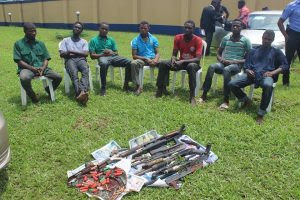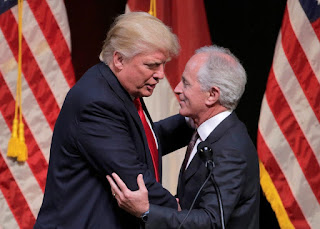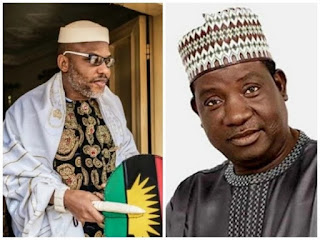REGIONAL ENVOYS MEET MUGABE IN A BID TO END ZIMBABWE CRISIS
Veteran president resists military pressure to step down as army retains control
Robert Mugabe talks to General Constantino Chiwenga at State House in Harare on Thursday
South African envoys held talks with President Robert Mugabe and his army chief on Thursday as regional powers sought to resolve a stand-off triggered by the military's takeover of Zimbabwe. Hours after Mr Mugabe's motorcade was seen leaving his home in a Harare suburb, The Herald, a state-controlled newspaper, published pictures showing the president meeting with the two South African ministers and General Constantino Chiwenga, the army commander, in State House. The army chief led the military intervention on Wednesday when Mr Mugabe was put under house arrest. The 93-year-old leader, who has ruled Zimbabwe since independence from Britain in 1980, has been resisting military pressure to publicly resign, said Ibbo Mandaza, a former senior member of the ruling Zanu-PF party.
A Catholic priest has been mediating between Mr Mugabe and army chiefs and attended Thursday's talks at State House. A military spokesman said on Wednesday the intervention was "targeting criminals around him who are committing crimes that are causing social and economic suffering in the country". Insisting it was not conducting a coup, the army said Mr Mugabe and his family were in a "safe and secure place". But the military has not made any statements since a spokesman addressed the nation on state television early on Wednesday.Members of the Southern African Development Community, a regional bloc that has called on the Zimbabwean army to avoid an "unconstitutional" change in government and urged "calm and restraint", met in Botswana on Thursday to respond to the crisis. The meeting was called by Jacob Zuma, the chair of SADC and president of South Africa, which has long worried about instability in Zimbabwe spilling across its borders.
Hundreds of thousands of Zimbabweans have fled to South Africa during the past two decades as their economy collapsed.Mr Zuma, who sent the envoys to Harare, spoke to Mr Mugabe on Wednesday and said he "indicated that he was confined to his home but said that he was fine".Mr Mugabe's apparent refusal to bow to military pressure, combined with SADC's stance against an "unconstitutional" change, could delay a transition of power by weeks, analysts said."They want Mugabe to abdicate. If he refuses, what do they do now?" Mr Mandaza said. Timeline: despot's economic impact.
2000 - Robert Mugabe begins a land reform programme under which white-owned farms are seized. March 2008 - Ruling Zanu-PF party loses parliamentary elections. Mr Mugabe wins a presidential run-off after his main opponent Morgan Tsvangirai pulls out because of violence against his supporters.
February 2009Zanu-PF forms a unity government with the opposition, which helps stabilise the country. The dollar is then introduced as the main currency to combat hyper-inflation.
July 2013 - Mr Mugabe and Zanu-PF win elections, but the opposition claims the polls were rigged.
The military intervention came a week after Mr Mugabe sacked Emmerson Mnangagwa, vice-president and a veteran of Zimbabwe's liberation fight, in a move that appeared to put Grace Mugabe, 52, on course to succeed her ailing husband. Mr Mnangagwa, 75, had fled to South Africa and said he would challenge the rule of Mr Mugabe, who was using the Zanu-PF as his "personal property". He enjoys support from veterans of the liberation struggle and is an ally of Gen Chiwenga.
Mr Mugabe's apparent refusal to quit has placed Mr Mnangagwa in an "invidious position" by impeding plans for him to helm a constitutionally legitimate government, Mr Mandaza said. Before his dismissal, Mr Mnangagwa was locked in a succession battle with Mrs Mugabe, the president's former secretary who was backed by a Zanu-PF faction known as the G40 because it includes younger members of the ruling party. Zimbabweans on Harare's streets said they were desperate for any change after years of political instability and economic hardship — even one brought by force.
"He [Mugabe] is a failure — 37 years of failure. He didn't do anything for Zimbabwe's people," said Tigere Mukaj, a street vendor, who said he backed removal of the president. Most said they wanted elections to follow a transitional government led either by the army or a unity coalition formed of Zanu-PF and the opposition. Morgan Tsvangirai, leader of the opposition Movement for Democratic Change, returned to Zimbabwe on Wednesday night. In a joint statement, more than 100 Zimbabwean civil society organisations said Mr Mugabe should "voluntarily step down and pave way for an all-inclusive" process to decide the next government. The army should issue a clear road map to restoring constitutional order, they added.
Analysts say Mr Mnangagwa is expected to return and could be reinstated as vice-president. He could then be sworn in as acting president at a conference of the Zanu-PF party that is scheduled for next month.
Elections that were expected to be held at the beginning of next year could be delayed to allow "space for a six-month transitional administration to oversee the laying of the ground" for credible polls, said Piers Pigou, an analyst with the International Crisis Group.
Soldiers on Thursday patrolled outside the state house and other government buildings in Harare, and parliament stayed closed. But the armoured personnel carriers that had blocked roads in the capital as the takeover swept into action on Wednesday were parked on the side of streets in the city centre. Shops and other businesses were open, with long queues forming outside banks as normal as people struggled with a severe currency shortage. Vendors said they had seen no drop in trading.
The Herald, the state-owned newspaper now under military direction, carried the headline "Business as usual across the nation" and called on civil servants to report to work as normal. In a market off Robert Mugabe Road in central Harare, Zimbabweans said they were getting used to saying what they really thought about the autocratic leader who has ruled for nearly four decades. "I want that bastard gone," said a 62-year-old pensioner who declined to give his name. "This country belongs to God, not to Mugabe and his family. Grace, she is a bitch, that lady. What the army is doing is good."Tendayi Madzongwe, 34, a minibus driver, said he felt "free".
"Everything is cool" with the army, he said. "Whoever comes after [Mr Mugabe], it's OK. "Bright Matonga, a former deputy government spokesman, said of Mr Mugabe's demise: "I'm thrilled. This is like Christmas come early. We thought he was going to die in power. We said let's just suffer and when he dies common sense will prevail." Mr Matonga said he expected 200,000 people to gather on Saturday at a rally organised by army veterans. By that time, he hoped Mr Mugabe would have agreed to step down clearing the way for Mr Mnangagwa to be sworn in as acting president. Mr Mugabe and his family needed to leave the country, he said. "It's good for him and his family to take a break. I'm sure he has enough money to go abroad."








Comments
Post a Comment